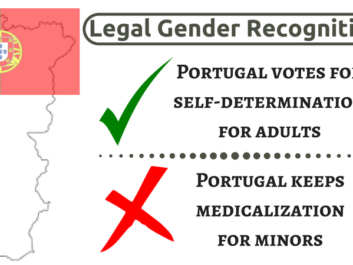Portugal Votes for Self-Determination, Keeps Medicalisation for Minors

The Portuguese parliament adopted yesterday a law that will base legal gender recognition on self-determination for adults. Self-determination for those aged 16 – 18 years was contested by the President in an earlier version of the law. Following his veto, the law now foresees that a person between 16 -18 years will need parental consent and a report from a doctor. Any doctor or psychologist can draw up the statement confirming the person’s free choice and the absence of impediments.
TGEU is relieved that the general concept of self-determination survived political opposition, but regrets the additional barriers for minors.
“We congratulate the trans community and its allies in Portugal. This law recognises the simple fact that trans people are the ones who know best who they are. No doctor or judge can or should get to assess a person’s gender identity. This also includes young people.”
“However, TGEU regrets that those younger than 16 years have no chance to get legal recognition. They are told to simply sit it out, even if legal gender recognition could make a big difference to their lives. Whether you are below or above 16 years of age, the right to self-determination and recognition before the law does not know any age limit.“ comments Richard Köhler, TGEU Senior Policy Officer.
The law will also introduce a moratorium on genital surgeries on intersex infants, but not a full ban on surgeries on children who cannot give consent, as demanded from intersex activists.
On April 13th, the Parliament adopted a law basing gender recognition legislation on self-determination from age 16. The Portuguese president Marcelo Rebelo de Sousa vetoed the law citing concerns over the self-determination for minors, sparking criticism from European and domestic human rights activists. On July 6th, TransMissão: Associação Trans e Não-Binária delivered 23,000 signatures to the Portuguese Parliament, urging them to allow young transgender people access to legal gender recognition without any medical authorisation.
The version presented and voted on yesterday will be sent to the president for his signature.